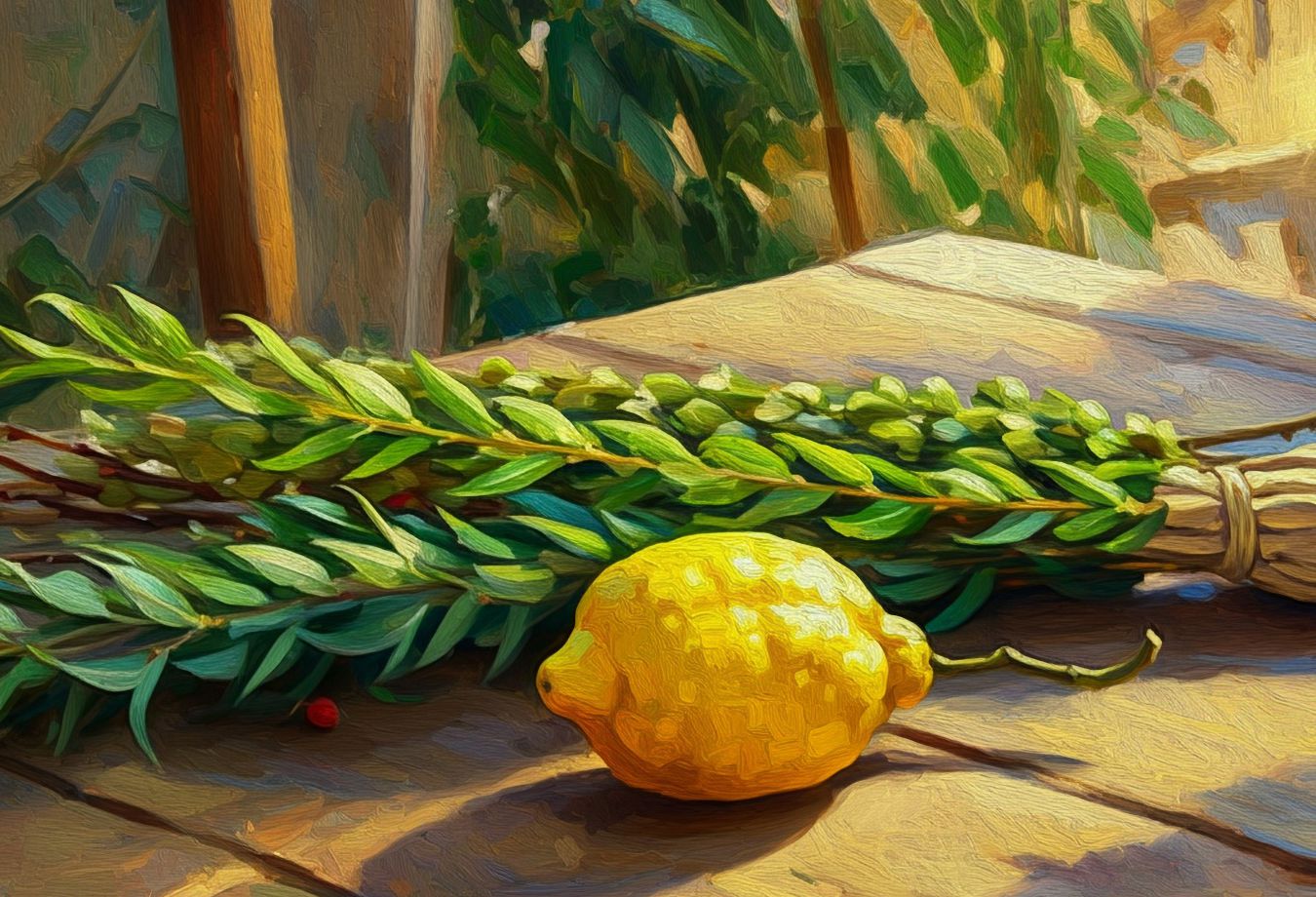These are seven, deep, impactful ways to connect meaningfully to the Yom Tov of Sukkos.
We are about to immerse ourselves in nine days of closeness, of joy and of connection. Nine beautiful, precious days whose impact will hopefully carry us through the rest of the year. Every year, I try to zoom in on one aspect of Sukkos and make it the focus of my article. This year, I wasn’t quite up to the task of choosing one foundation over another; instead I’ve encapsulated a little bit of everything.
There are so many ways we can grow over Sukkos, so much meaning in every moment. Here are seven life lessons we can take away from this beautiful chag.
Materialism Doesn’t Bring Joy
This is the Yom Tov of joy, and we celebrate it by leaving all of the comforts of home behind to dwell in a shaky, temporary dwelling. Yes, many of us have been zoche to up the ante of our hiddur mitzvah to create a sukkah that is a palace, with plush couches and king size beds and temperature regulation apparatus, a far cry from the “sukka’le a kleina” of old. And yet, no matter how much gashmiyus we’ve brought into our sukkah, it’s still a far cry from the luxuries we are used to in our home. The symbolism of the sukkah still stands strong as a reminder that we are happiest when we leave our gashmiyus behind and surround ourselves with ruchniyus.
And if the sukkah itself fails to sufficiently inspire us to focus on what matters, we have the extra gift of megillas koheles that ensures that the message hits home.
Everything in this world is vain, Shlomo Hamelech tells us, and the sooner we can stop our pursuit of earthly pleasures, the sooner we will realize just how miserable that pursuit makes us. Simply for the reason that this is all it will ever be: a pursuit. We’re constantly running after worldly pleasures, but never quite snagging them for long. This year’s beautiful new Sukkos outfit might bring you joy, but by next year, you’ll need a new one to feel that joy again. It might not even take next season for the joy to fade: it might be as soon as the credit card bill arrives. (Of course, beautiful clothing for yom tov is a value, and if you are buying it for the right reasons, that joy is eternal!)
The food we gorge on might make us happy for a few moments, but when the taste has faded and the heartburn has lingered, we are left feeling unfulfilled if it was only about the food.
Materialism is temporary; its pursuit brings misery.
But our Sukkah, our Torah, our connection – that is where true joy lies.
Standing on the Shoulders of Giants
We enter our sukkah in anticipation of what will hopefully be a delicious and meaningful seudah. But before we do anything, before we make kiddush, before we eat, we stop to invite our forefathers into this sacred space. We are untethering ourselves from the material and reconnecting with the spiritual, and we remind ourselves of the source of that connection.
We come from greatness; these are our forebearers, the ones who have made us who we are today as a nation, and as individual members of that nation. Our strength and our holiness, everything we have and everything we are comes from our avos hakedoshim, from the exalted shepherds who came before us.
They are there with us every day of Sukkos, as a reminder to bring them with us into our journeys beyond these walls and these days, into our own deserts and sukkos.
“If I see farther than others, it is because I stand on the shoulders of giants.” Sir Isaac Newton may have coined that expression about his own wisdom and discoveries but it rings true for our own status as the am hanivchar. Our strength and our beauty is in the leaders upon whose shoulders we stand. When we disengage ourselves from their greatness, we may see no further than any Joe on the street.
On Sukkos, we remind ourselves of the chain linking us to the past, strengthening us for the future, and keeping us closely connected to our Father.
United with our Brethren

Every child of a certain age knows the symbolism of the arba minim in how they each represent a different type of Jew. On Sukkos we take them all together, we hold them close and we bring them into our Sukkah to shake. Every Jew, whether they are an esrog, beautiful in scent and taste, whether they are an aravah, bland in neither, needs to be held close.
A few years ago, I wrote a poem about a foolish man who decides to buy four of the same min, whether for aesthetic, financial, etc. reasons. We laugh at him, but when we make it our business to only associate with and only respect people who are just like us, that is essentially what we are doing.
Sukkos is a beautiful time to show every member of klal yisroel that they are cherished, no matter how far they have strayed, or no matter how different their derech may be.
It doesn’t have to be a contradiction between having a conviction in your derech and its validity and loving a brother who is on a different one.
This Sukkos, reach out, draw in. Hold close!
Our Worth as His Child
Aside from a reminder to embrace our brethren, the arba minim also remind us of our own worth. If one min is missing, our arba minim are incomplete. No matter how lowly you might hold yourself, you are an integral part of Hashem’s nation. He wants you there, no matter how devoid of maasim tovim you might be.
He reminds us of our specialness come Shmini Atzeres, when after a week long of celebration, a week of togetherness, He says, “Stay with me one more day.”
When you really think about it, it should move you to tears.
Imagine you move into your parents’ home for a week. You barely lift a finger to help; you’re just too tired. Your kids are whiny and messy. Your dishes form a mountain in her sink. You’re underfoot and in the way and she gives endlessly of her time to listen to you, to advise you, to sympathize. After the week is up, you are sure that she is counting down the seconds until she has the house to herself, that she is watching your packing progress with glee and anticipation.
And yet, when you look at her, you don’t see irritation, you don’t see anticipation. You only see intense love and nachas shining on her face as she drinks in the sight of you and your children enjoying their last licks in her home. And just as you are about to leave, the nachas morphs into longing and she tugs at your sleeve.
“Please, stay another day. I’m not yet ready to let you go.”
Obviously the mashal has many flaws as will be the case when comparing Hashem to a mortal parent so to speak, but just picture that feeling that washes over you when you realize that for all of your flaws and failings, your mother still cherishes the time you spend together and wants you to stay longer.
Can you feel the Divine love? Can you feel the Heavenly embrace?
You count and you matter, today and every day.
Surrendering to His Control
On Rosh Hashanah, we were mamlich Hashem, and on Sukkos we put our subservience into practice. We remind ourselves that all we have and all we are, come from Him. During the harvest season, when it is natural to gloat in our bounty, the fruits of our labor, we remind ourselves that it is not the fruit of our labor, but the result of His will that allowed us this bounty. We throwback to an era where we were completely at His mercy, following Him into the desert at His word. We were surrounded by the elements, danger at every turn, and we could rely only on Him. There was no backup plan; there were no illusions as to Whose Hands guided us and protected us every step of the way. Today, we can hide behind the smokescreen of hishtadlus and forget who is truly pulling the strings. We sow, we plant, we harvest. We work, we earn, we pocket. It’s so easy to get lost in the illusion of our own control. That’s why, for one week a year, we get back into those huts. We harken back to those days when it was all Him to remind ourselves that nothing has changed. Today, like yesterday, we are totally and completely in His hands.
Gratitude
It’s not enough to remember where it all comes from, we also need to be grateful for it all. We gather in our crops, counting our blessings, and go into our sukkah to remind ourselves that we need to thank Him for His bounty. And we spend the week singing Hallel, thanking and praising Him for all of the blessings that permeate our lives.
It is no secret that gratitude is a conduit to joy. Experts always advise those seeking to increase the joy in their lives to keep a gratitude journal. Reflecting on all that we are grateful for leads us to a more mindfully joyous life. It takes our gashmiyus and transforms it to runchiyus too, so that our joy is a true joy and not a fleeting one.
When we take what we have for granted and don’t remember where it comes from, don’t feel the love and kindness inherent in the gift, we will be left wanting. Gratitude ensures that we are happy with what we have and don’t feel entitled to more. On Sukkos, we remember that gratitude as we count our grains and our crops. We turn to Hashem and thank Him for all that He has granted us.
Closeness to Hashem is the Greatest Joy
I’ve always found that the anticipation of and the appreciation for Sukkos has a direct correlation with how meaningful my Yomim Noraim were. After a marathon of teshuvah and tefillah and a whirlwind preparation period, sitting down in the sukkah you can almost tangibly feel the joy and the closeness. When the Days of Awe were a struggle, when we got lost in the minutia of getting ourselves dressed and fed and lose focus on the big picture, we feel the emptiness come Sukkos time. It’s not the same exhilaration. It’s not the same glow. Because nothing brings us more joy than closeness to Hashem, and when we have truly felt the closeness, we can truly experience the joy.
And that joy, you’ll know when you feel it, because you won’t be able to find the words to express it.
Wishing all of you a Sukkos full of such internal and eternal joy, you can’t even put it into words.





Thank you! This was a beautiful article as your articles always are. Relevant and practical. I want to add to the point about having achdus with all types of jews. Let’s remember that this applies to those on a more stringent path than us as well! Sometimes we find ourselves judging people for being “too frum”. Good Yom tov to all!
I love how each lesson from Sukkos connects to everyday life — especially the reminders about joy, gratitude, and unity. snow rider